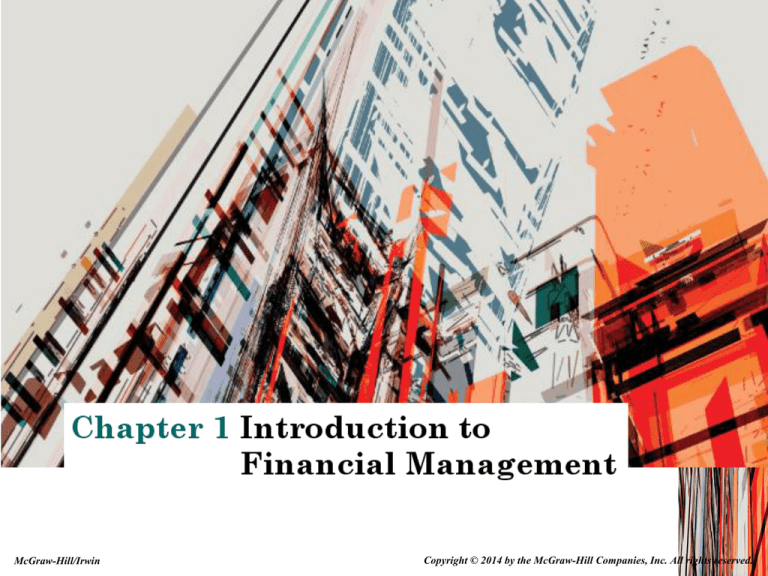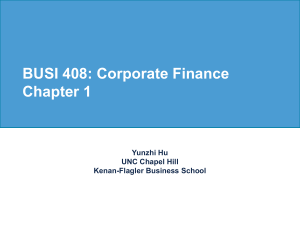
McGraw-Hill/Irwin
Copyright © 2014 by the McGraw-Hill Companies, Inc. All rights reserved.
Key Concepts and Skills
Have a good understanding of:
• The basic types of financial management
decisions and the role of the financial
manager
• The goal of financial management
• The financial implications of the different
forms of business organization
• The conflicts of interest that can arise
between owners and managers
1-2
Basic Areas Of Finance
1.
2.
3.
4.
Corporate finance = Business Finance
Investments
Financial institutions
International finance
Return to
Quick Quiz
1-3
Investments
• Work with financial assets such as stocks
and bonds
• Value of financial assets, risk versus
return, and asset allocation
• Job opportunities
– Stockbroker or financial advisor
– Portfolio manager
– Security analyst
1-4
Financial Institutions
• Companies that specialize in financial
matters
– Banks – commercial and investment, credit
unions, savings and loans
– Insurance companies
– Brokerage firms
• Job opportunities
1-5
International Finance
• An area of specialization within each of
the areas discussed so far
• May allow you to work in other countries
or at least travel on a regular basis
• Need to be familiar with exchange rates
and political risk
• Need to understand the customs of other
countries; speaking a foreign language
fluently is also helpful
1-6
Why Study Finance?
• Marketing
– Budgets, marketing research, marketing financial
products
• Accounting
– Dual accounting and finance function, preparation
of financial statements
• Management
– Strategic thinking, job performance, profitability
• Personal finance
– Budgeting, retirement planning, college planning,
day-to-day cash flow issues
1-7
Business Finance
• Some important questions that are
answered using finance
– What long-term investments should the firm
take on?
– Where will we get the long-term financing to
pay for the investments?
– How will we manage the everyday financial
activities of the firm?
1-8
Financial Manager
• Financial managers try to answer some, or all,
of these questions
• The top financial manager within a firm is
usually the Chief Financial Officer (CFO)
– Treasurer – oversees cash management, credit
management, capital expenditures, and financial
planning
– Controller – oversees taxes, cost accounting,
financial accounting, and data processing
1-9
Corporate Organization Chart
Figure 1.1
1-10
Financial Management
Decisions
• Capital budgeting
– What long-term investments or projects
should the business take on?
• Capital structure
– How should we pay for our assets?
– Should we use debt or equity?
• Working capital management
– How do we manage the day-to-day finances
of the firm?
Return to
Quick Quiz
1-11
Forms of Business
Organization
Three major forms in the United States
•Sole proprietorship
•Partnership
– General
– Limited
•Corporation
– S-Corp
– Limited liability company
Return to
Quick Quiz
1-12
Sole Proprietorship
Business owned by one person
• Advantages
– Easiest to start
– Least regulated
– Single owner keeps all of
the profits
– Taxed once as personal
income
• Disadvantages
– Limited to life of owner
– Equity capital limited to
owner’s personal wealth
– Unlimited liability
– Difficult to sell ownership
interest
1-13
Partnership
Business owned by two or more persons
• Advantages
• Disadvantages
– Two or more owners
– More capital available
– Relatively easy to start
– Income taxed once as
personal income
– Unlimited liability
• General partnership
• Limited partnership
– Partnership dissolves
when one partner dies or
wishes to sell
– Difficult to transfer
ownership
1-14
Corporation
A legal “person” distinct from owners and a
resident of a state
• Advantages
• Disadvantages
– Limited liability
– Separation of ownership
and management (agency
– Unlimited life
problem)
– Separation of ownership
– Double taxation (income
and management
taxed at the corporate
– Transfer of ownership is
rate and then dividends
easy
taxed at personal rate,
– Easier to raise capital
while dividends paid are
not tax deductible)
1-15
International Corporate Forms
• All of these forms feature public
ownership and limited liability
1-16
Goal Of Financial Management
• What should be the goal of a
corporation?
– Maximize profit?
– Minimize costs?
– Maximize market share?
– Maximize the current value per share of
the company’s existing stock
– Maximize the market value of the
existing owners’ equity
Return to
Quick Quiz
1-17
Goal Of Financial Management
• Does this mean we should do anything
and everything to maximize owner
wealth?
– Outsourcing?
– Off-shoring?
– Enron?
– Corporate support of charities?
1-18
Sarbanes-Oxley Act
(SarBox, 2002)
• Driven by corporate scandals
– Enron, Tyco, WorldCom, Adelphia
• Intended to strengthen protection
against accounting fraud and financial
malpractice
• Compliance very costly
– Firms driven to:
• Go public outside the U.S.
• Go private (“go dark”)
1-19
The Agency Problem
• Agency relationship
– Principal hires an agent to represent its
interests
– Stockholders (principals) hire managers
(agents) to run the company
• Agency problem
– Conflict of interest between principal and
agent
• Management goals and agency costs
Return to
Quick Quiz
1-20
Do Managers Act in the
Shareholders’ Interests?
• Managerial compensation
– Incentives can be used to align management
and stockholder interests
– Incentives need to be carefully structured to
insure that they achieve their goal
• Corporate control
– Threat of a takeover may result in better
management
• Other stakeholders
1-21
Example: Work the Web
• The Internet provides a wealth of
information about individual companies
• “finance.yahoo.com” is an excellent site
• Example:
–
–
–
–
Southwest Airlines (LUV)
Harley- Davidson (HOG)
Starwood Hotels & Resorts (HOT)
American Express (AXP)
1-22
Cash Flows Between the Firm and the
Financial Markets
Figure 1.2
1-23
Financial Markets
• Cash flows to the firm
– Equity vs. Debt
• Primary vs. secondary markets
– Dealer vs. auction markets
– Listed vs. over-the-counter securities
• NYSE
• NASDAQ
1-24
Quick Quiz
• What are the four basic areas of finance? (Slide
1.4)
• What are the three types of financial
management decisions, and what questions are
they designed to answer? (Slide 1.13)
• What are the three major forms of business
organization? (Slide 1.14)
• What is the goal of financial management?
(Slide 1.19)
• What are agency problems, and why do they
exist within a corporation? (Slide 1.22)
1-25
Chapter 1
END
1-26











